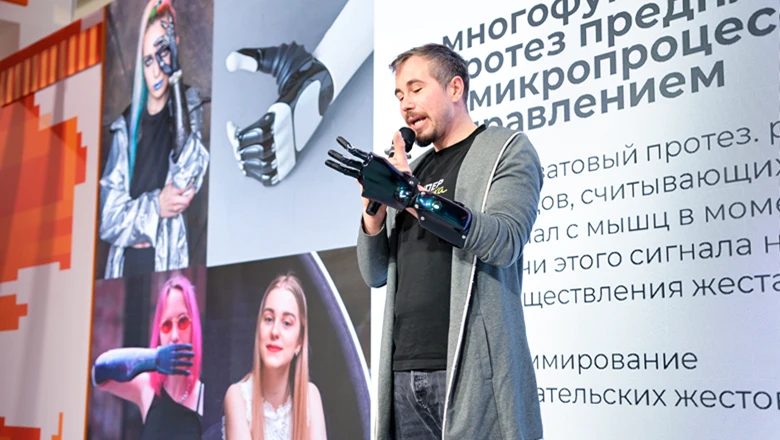Guests of the RUSSIA EXPO learned about high-tech bionic prostheses manufactured in Russia
07.12.2023
In Pavilion E at VDNH, the Ministry of Industry and Trade of the Russian Federation organized a lecture "Cyberpeople. High-tech and bionic prostheses - made in Russia". Guests of the International RUSSIA EXPO were immersed in the atmosphere of the cyber-present and future and heard interesting facts about the field of prosthetics.
During the event, guests were able to learn more about the history of prosthetics in different civilizations and countries, the features of modern technologies and appreciate a guitar performance by Maxim Yemets, cyber musician and manager of the Motorica cyborg community.
The development of the world's first solution that allows people with physical limitations to live a wholesome life began in the USSR - in the 60s, the so-called electrography method appeared. Modern bionic prostheses are still based on this technology today.
"The Motorica company is a successor of the great Soviet traditions. In seven years, we have made not just one prosthesis, but have created the widest line of prosthetic hands in the world. At the moment we have 6000 prostheses, more than 200 people in the team and users from 17 countries of the world," said the representative of the company Alexander Kurbanov.
The main advantage of Motorica is the creation of prostheses for children starting from the age of two. In addition to the colorful design, the developers of Motorica decided to supplement the "new hands" with playful elements to help kids adapt to them more easily and take pride in their uniqueness. The prosthetics now have built-in flashlights, jump ropes, and even holders for cutlery and writing utensils. For adults, they also have their own perks. For example, the company's ambassador, cybermodel and blogger Veronika Levenets had her prosthesis encrusted with 6,000 Svarovski stones.
Recently, Roman Kostomarov, Olympic champion in ice dancing, joined the ranks of those who use Motorica prostheses. Speaking at the "Made by Us" pavilion of the Ministry of Industry and Trade of the Russian Federation, the athlete noted the convenience of using the prosthesis and the possibility to lead his usual active life: "Domestic technologies have made a huge step forward in their development. For example, the bionic prosthesis from Motorica, which is manufactured in Russia, gives me the opportunity to feel like a full-fledged person. Of course, nothing compares to the feeling of my own hands and feet. But Russian innovations have taught me to live again and allow me to motivate other people in difficult situations".
After the open dialog "Iron Will and Industry for Life", where Roman spoke about his new experience, he expressed hope that it will help children with disabilities to adapt to prostheses more easily: "Children will still learn something for themselves from my lecture, and it will help them in the future to fight and move forward, to achieve results".
In turn, Alexander Kurbanov noted that despite the technology and external appeal, the prostheses still need to be improved. Much attention is paid to the inertial control system. If muscles lose the ability to transmit any signals when injured, optical sensors will help. Artificial intelligence will be able to understand how a healthy hand would make this or that gesture, and the prosthesis will complete the movement of the hand independently. With such technologies, a person will stop noticing the difference between a prosthetic and a real hand.
The next problem being fine-tuned now is the fight against phantom pains, which can impair the quality of life of people who have undergone amputation. The company has found an effective solution - implantation of electrical stimulators into one of the peripheral nerves of the hand. As part of the trials, in addition to pain relief, the person with the prosthesis was able to determine the size of an object, as well as its hardness or softness. In further tests, the Motorica team plans to achieve even greater sensitivity.
In the current reality, localization of production is also an important factor. According to Alexander Kurbanov, Motorica's mechanical prostheses are 100% made of Russian components, but two parts of bionics - micro-motors and chips - are still difficult to replace: "In principle, we are moving towards full import substitution. We are very grateful to the Ministry of Industry and Trade, which has provided us with micromotors from domestic manufacturers. In 2024, we will start testing them".
Possibly interesting
02.06.2025
The National Centre RUSSIA invites couples to say "I do!" at the country’s main wedding venue
Applications can be submitted until June 4.
02.06.2025
Online routes through the RUSSIA EXPO won special prize at the Gravitation Award
Thanks to the "Online Tours," users can take a virtual 360-degree walk through the pavilions of the RUSSIA EXPO.
02.06.2025
Talk shows, workshops and discussions: the National Centre RUSSIA invites you to celebrate Global Exhibitions Day
In 2025, Global Exhibitions Day will be held under the motto "Speaking the Same Language."



